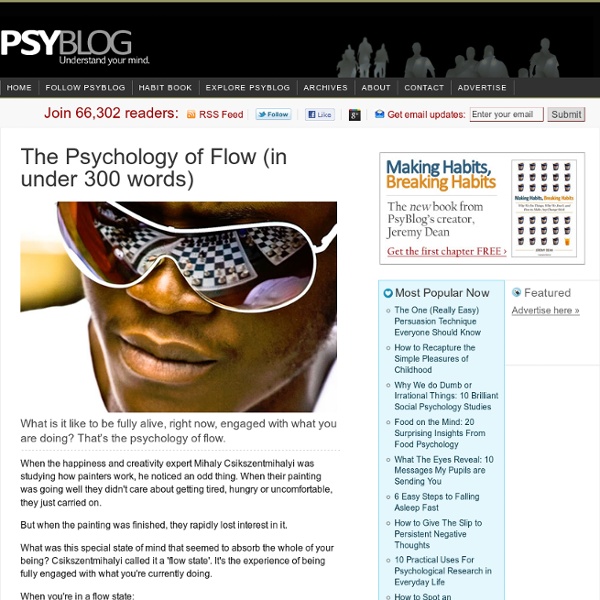The Psychology of Flow (in under 300 words)

Why great ideas come when you aren’t trying
History is rich with 'eureka' moments: scientists from Archimedes to Isaac Newton and Albert Einstein are said to have had flashes of inspiration while thinking about other things. But the mechanisms behind this psychological phenomenon have remained unclear. A study now suggests that simply taking a break does not bring on inspiration — rather, creativity is fostered by tasks that allow the mind to wander. The discovery was made by a team led by Benjamin Baird and Jonathan Schooler, psychologists at the University of California, Santa Barbara. Jeremy Mayes / GETTY IMAGES Archimedes made his breakthrough discovery of displacement while relaxing in the bath. After the two minutes were over, participants were given a 12-minute break, during which they rested, undertook a demanding memory activity that required their full attention or engaged in an undemanding reaction-time activity known to elicit mind-wandering.
The Impressive Power of a Stranger’s Advice
Spend more wisely by learning to take other people’s surprisingly accurate advice. Most people are much better at giving advice than taking it. When it comes to spending our money, we like to think we know best what will make us happy. What does the guy next door or a colleague at work know about how we should spend our money? Imagine you are going on a 5 minute speed date with a stranger. Either: a photograph of them with an autobiography.Or: the rating of a previous speed dater (who is a stranger to you). Which one do you think will better predict how much you’ll enjoy the speed date? If you are like most of the participants in an experiment by Gilbert et al. (2010) then you’ll go for number 1. We’re all different, right? In the experiment, though, the ratings of a previous speed dater were the best predictor of how much people enjoyed their speed date. Here’s one that’s even weirder. First of all, let’s give you a couple of options to choose from. Perhaps you’re a bit more wary now?
What The Eyes Reveal: 10 Messages My Pupils are Sending You
The dilation and constriction of the pupils reveals how hard we’re thinking, how excited or disgusted we are and more… Our pupils, the black holes which let light into the eyes, don’t just help us see, they also signal what’s going on in our minds. Here are 10 pieces of psychological research which show how changes in pupil size reveal many aspects of thought. 1. Look into my eyes and ask me to name the cigar-smoking founder of psychoanalysis and you won’t see much change in my pupil size. But ask me to explain the laws of cricket and watch my pupils expand. That’s because research has shown that the harder your brain works, the more your pupils dilate. 2. Keep watching my eyes closely and you’ll spot the point when explaining the laws of cricket gets too much. Poock (1973) reported that when participants’ minds were loaded to 125% of their capacity, their pupils constricted. It’ll be trying to explain a googly that will do it. 3. 4. Their pupils widened at first for all three. 5. 6. 7. 8.
Self-report study
A self-report study is a type of survey, questionnaire, or poll in which respondents read the question and select a response by themselves without researcher interference. A self-report is any method which involves asking a participant about their feelings, attitudes, beliefs and so on. Examples of self-reports are questionnaires and interviews; self-reports are often used as a way of gaining participants' responses in observational studies and experiments. Self-report studies have validity problems. Patients may exaggerate symptoms in order to make their situation seem worse, or they may under-report the severity or frequency of symptoms in order to minimize their problems. Patients might also simply be mistaken or misremember the material covered by the survey. Questionnaires and interviews[edit] Questionnaires are a type of self-report method which consist of a set of questions usually in a highly structured written form. Open and closed questions[edit] Rating scales[edit] Validity[edit]
Related:



